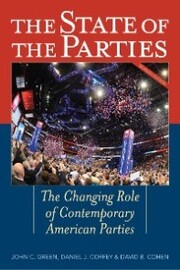<span><span>Continuing a three-decade tradition,</span><span>The State of the Parties 7</span><span><sup>th</sup></span><span> edition</span><span> brings together leading experts to evaluate change and continuity in American electoral politics. Political parties in America have never been more contentious and divided than they are right now. Even splits within the parties themselves have the power to elevate relatively unknown candidates to power and topple established incumbents. With sections devoted to polarization and the electorate, polarization and political elites, tea party politics, super PACS, and partisan resources and partisan activities, the contributors survey the American political landscape.</span><span>They pay special attention to polarization between and within the parties in the aftermath of the 2012 election, demographic changes to Americas political parties, the effects of new media and campaign finance laws on national and local electoral results, the Tea Partys rise and, as always, the implications of all these factors on future policymaking and electoral prospects.</span><span>The State of the Parties 7</span><span><sup>th</sup></span><span> edition</span><span> offers an indispensable guide to American politics for scholars, students, and practitioners.</span><span><br><br>Contributions by: Alan Abramowitz, Paul A. Beck, Michael John Burton, Edward G. Carmines, Daniel J. Coffey, William F. Connelly, Jr., Meredith Dost, Diana Dwyre, Michael J. Ensley, Peter L. Francia, Erik Heidemann,,Shannon Jenkins, Caitlin E. Jewitt, David C. Kimball, Robin Kolodny, Thad Kousser, David B. Magleby, Seth Masket, William G. Mayer, Eric McGhee, William J. Miller, Jonathan S. Morris, Ronald Rapoport, Douglas D. Roscoe, Dante Scala, Daniel M. Shea, Boris Shor, Walter Stone, Jeffrey M. Stonecash, Eric C. Vorst, Michael W. Wagner<br></span></span><br><span></span>
The State of the Parties brings readers up to date on party action in election years and in between. This essential party primer includes: new chapters on polarization between and within the parties in the aftermath of the 2012 election, demographic changes to America¿s political parties and the effects of new media and campaign finance laws on national and local electoral results, an analysis of the Tea Party¿s rise to relevance and the kind of impact they have had on the American polity, and as always, the implications of all these things on future policymaking and electoral prospects moving forward.
IntroductionCoffey, Green and CohenIWhy So Polarized?Why American Political Parties Cant Get Beyond the Left-Right Divide (Edward G. Carmines, Indiana University, Michael J. Ensley, Kent State University, Michael W. Wagner, University of Wisconsin). American Electorate: Explaining Polarization in Feeling Thermometer Ratings of the Parties (Alan Abramowitz, Emory University)Political Identity and Party Polarization in the American Electorate (David C. Kimball, Bryce Summary, and Eric C. Vorst, University of Missouri-St. Louis)The End of the Two-Tiered Electoral System (William G. Mayer, Northeastern University)IIElite PolarizationCongressional Polarization and Presidential-House Election Results (Jeffrey M. Stonecash, Syracuse University)Congress: Partisan, Polarized, Yet Not Dysfunctional? William F. Connelly, Jr., Washington and Lee UniversityTwo Parties Divided by a Common Language? Regional Sources of Partisan Disagreement (Daniel J. Coffey, University of Akron)Party Polarization in Americas State Legislatures (Boris Shor, University of Chicago, Harris School)IIIThe 2012 Presidential ElectionThe Role of Rules in the 2012 Presidential Nominations (Caitlin E. Jewitt, Indiana University-Purdue University Indianapolis)Kingmakers or Cheerleaders? Party Power and the Causal Effects of Endorsements (Thad Kousser, University of California, San Diego, Seth Masket, University of Denver, and Eric McGhee, Public Policy Institute of California)The Ground Game from the Voters Perspective: 2012 and Before (Paul A. Beck, The Ohio State University and Erik Heidemann, Kent State University)IVThe Tea Party and the 2012 ElectionThe Tea Party and the 2012 Election Ronald Rapoport, College of William and Mary, Meredith Dost, College of William and Mary, and Walter Stone, University of California, Davis)The Divided Republicans: Tea Party Supporters, Establishment Republicans, and the Role of Social Networking Media in Driving Polarization (Peter L. Francia and Jonathan S. Morris, East Carolina University)Who Needs Enemies? The Tea Party Impact on the Republican Party (William J. Miller, Flagler College and Michael John Burton, Ohio University)VCampaign FinanceThe Changing Role of Hill Committees in the Age of Super PACS (Diana Dwyre, California State University, Chico and Robin Kolodny, Temple University)Towards a Typology of Super PACs: Candidate, Party or Group Centered? (David B. Magleby, Brigham Young University)The Importance of Building a Donor Network in the Presidential Primary: Lessons Learned by the 2012 Republicans (Dante Scala, University of New Hampshire)VIState and Local PartiesChanges in Local Party Structure and Activity, 1980-2010 (Douglas D. Roscoe and Shannon Jenkins, University of Massachusetts, Dartmouth)Separated We Stand? The Impact of Ideological Sorting on Local Party Dynamics (Daniel M. Shea, Colby College)Mahoning Democrats
„E-Book“ steht für digitales Buch. Um diese Art von Büchern lesen zu können wird entweder eine spezielle Software für Computer, Tablets und Smartphones oder ein E-Book Reader benötigt. Da viele verschiedene Formate (Dateien) für E-Books existieren, gilt es dabei, einiges zu beachten.
Von uns werden digitale Bücher in drei Formaten ausgeliefert. Die Formate sind EPUB mit DRM (Digital Rights Management), EPUB ohne DRM und PDF. Bei den Formaten PDF und EPUB ohne DRM müssen Sie lediglich prüfen, ob Ihr E-Book Reader kompatibel ist. Wenn ein Format mit DRM genutzt wird, besteht zusätzlich die Notwendigkeit, dass Sie einen kostenlosen Adobe® Digital Editions Account besitzen. Wenn Sie ein E-Book, das Adobe® Digital Editions benötigt herunterladen, erhalten Sie eine ASCM-Datei, die zu Digital Editions hinzugefügt und mit Ihrem Account verknüpft werden muss. Einige E-Book Reader (zum Beispiel PocketBook Touch) unterstützen auch das direkte Eingeben der Login-Daten des Adobe Accounts – somit können diese ASCM-Dateien direkt auf das betreffende Gerät kopiert werden.
Da E-Books nur für eine begrenzte Zeit – in der Regel 6 Monate – herunterladbar sind, sollten Sie stets eine Sicherheitskopie auf einem Dauerspeicher (Festplatte, USB-Stick oder CD) vorsehen. Auch ist die Menge der Downloads auf maximal 5 begrenzt.






